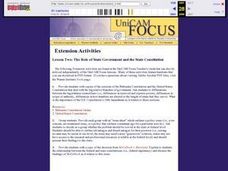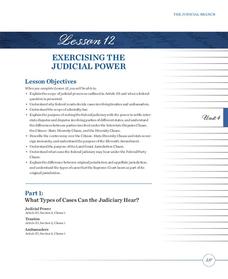Council for Economic Education
The Role of Government: The Federal Government and Fiscal Policy
Give learners a crash course in balancing the books on the United States federal government level with an economics and government resource. Class members engage in a warm-up discussion and brainstorming session before answering...
National Endowment for the Humanities
Lesson 4 James Madison: Internal Improvements Balancing Act—Federal/State and Executive/Legislative
Who has the power? The founding fathers asked the same question when the United States was formed. Learners explore issues that arose during Madison’s presidency that raised constitutional questions. Through discovery, discussion, and...
Delegation of the European Union to the United States
Structure of Government within the EU
The political system of the European Union is historically unique and has been constantly evolving. To better understand the structure of the EU, class members compare the EU's branches to those of the United States Federal Government.
School Improvement in Maryland
Dividing the Powers of Government
Who does what? To develop an understanding of the balance of power between the US federal and state governments, class members research responsibilities in terms of legal systems, security issues, economic activities, lawmaking, and...
Ohio Center For Law-Related Education
Four Activities: Thurgood Marshall and the Nomination and Confirmation of Federal Judges
The process of nominating and confirming federal judges can sound like a lot of bureaucratic hoops, but a resource breaks down the steps of the Supreme Court nominations in a simpler manner. Learners participate in four activities that...
iCivics
Governing Communities
The government at the local level acts as perhaps one of the most relevant government systems to many in their communities. Learners discover how the local government shapes their lives and the similarities and differences between the...
Federal Reserve Bank
The Story of the Federal Reserve: High School Lesson Plan
Is there a bank for the banks? Pupils analyze the complexities of the Federal Reserve system by breaking it down into easy-to-understand sections. Step-by-step investigation using flow charts and graphs of how the monetary system works...
Curated OER
The Role of State Government and the State Constitution
Students examine sections of the Nebraska Constitution and the U.S. Constitution, and compare/contrast the two. They research policy issues, and decide whether they should be solved at the state or federal level.
iCivics
For The President, All In A Day's Work
How does the president of the United States get the authority to exercise his/her duties? What responsibilities and tasks go into a hard day's work for the president? Here is a lesson plan that includes several instructional materials...
American Bar Association
What Is Separation of Powers?
Who has the power? Scholars investigate the creation of the three branches of government in the United States Constitution. They analyze just why the framers created the branches the way they did.
Curated OER
Comparing Governments
Twelfth graders research and discuss the different elements of the governments of China, Great Britain, Mexico and the United States. They discuss the differences between the various governments and create explanation cards for each type...
iCivics
Mini-Lesson: Executive Orders
Can the President of the United States pass a law all by himself? Scholars investigate the concept of the executive order in regards to the powers of the presidency. They use current issues and events to monitor media bias while also...
Curated OER
The Civil War
Although we currently focus on Abraham Lincoln's positive contributions in creating a more equal society, the truth is that Lincoln was actually a controversial character in his time! After studying the Civil War, give your high...
Curated OER
Executive Government: Executive Decision Making
Students explore executive decision making in the federal Cabinet. They are able to explain the need for executive decisions. Students explore how executive decisions are implemented through government departments.
Street Law
The Challenge of Selecting an Ideal Supreme Court Nominee
Nearly every president has had the opportunity to name a nominee to the United States Supreme Court. But what makes someone an ideal candidate to become a Supreme Court justice? High schoolers test their prior knowledge about the Supreme...
Curated OER
Participating in State and Local Government
Students analyze the structure, organization, and powers of State legislatures. They outline the overall shape of the office of the governor.
Students analyze the structure of local governments as creations of the State. They describe...
School Improvement in Maryland
Building a Pyramid
After reviewing the structure and powers of the three branches of the US government, groups investigate a problem and research what is being done to address this criticism.
iCivics
The Road to Civil Rights
Here is a fantastic resource on the civil rights movement! It includes reading materials and worksheets, and particularly highlights major legislation and the role of the judicial branch in the federal government in addressing the...
iCivics
Mini-Lesson: Congressional Committees
How exactly do both houses of Congress come to a formal decision on an issue? Scholars research the use of congressional committees as part of the legislative process. By using current events to analyze information, they see the role...
Heritage Foundation
Exercising Judicial Power
We should all do more exercising, but should the judicial branch as well? High schoolers develop their understanding of what powers the judicial branch carries because of the US Constitution, as well as where their limits lie in the...
Curated OER
Leaders in the Judicial Branch
Students examine the leadership roles and qualities of members of the judicial branch in public life. They view and discuss video clips from a federal judge and two Supreme Court judges.
Heritage Foundation
Courts and Judges
If the Supreme Court is so supreme, why do all cases not just start there? High schoolers learn why every case does not start at the Supreme Court as well as the importance of hierarchy in the US judicial system in the 11th installment...
Curated OER
The Rule of Law
Students examine the rule of law and government in this civics lesson plan. They discover the origins and how it impacts them on a daily basis. They also analyze its role in the judicial system.
Curated OER
Separation of Powers: Checks and Balances
Students discuss the reasons for separation of powers between the branches of government. They list the branches and identify the powers and functions of each.

























